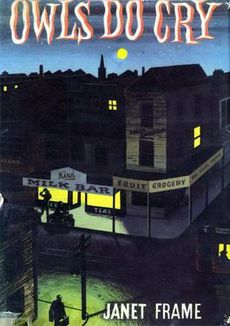Janet Frame facts for kids
Quick facts for kids
Janet Frame
|
|
|---|---|
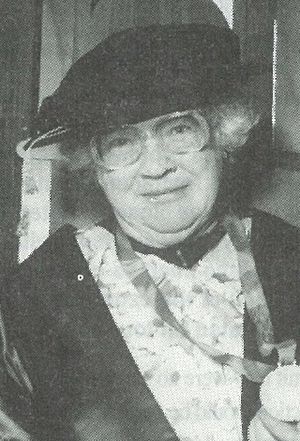
Frame in 1993
|
|
| Born | Janet Paterson Frame 28 August 1924 Dunedin, New Zealand |
| Died | 29 January 2004 (aged 79) Dunedin, New Zealand |
| Occupation | Novelist, short story writer, essayist, poet |
| Language | English |
| Genre | Modernism, magic realism, postmodernism |
| Notable works | An Angel at My Table |
Janet Paterson Frame (28 August 1924 – 29 January 2004) was a famous author from New Zealand. She was known around the world for her books, short stories, poems, and her own life story. She won many awards, including the Order of New Zealand, which is the highest honour a civilian can receive in New Zealand.
Janet Frame's fame came from her amazing life story as well as her writing. For many years, she was in psychiatric hospitals (places for people with mental health issues). She was even scheduled for a brain operation called a lobotomy. But just days before the surgery, her first book of short stories won a big national writing prize. This award saved her from the operation.
Many of her books and stories explore her childhood and her time in hospitals. Her award-winning three-part autobiography was made into a movie called An Angel at My Table (1990). It was directed by Jane Campion.
Contents
Janet Frame's Life Story
Early Years: 1924–1956
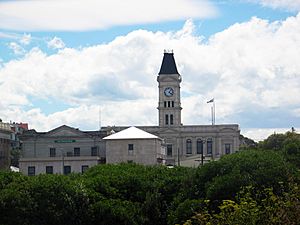
Janet Paterson Frame was born in Dunedin, New Zealand, on 28 August 1924. She was the third of five children in a working-class family with Scottish roots. Her father, George Frame, worked for the New Zealand railways. Her mother, Lottie, worked as a housemaid for the family of writer Katherine Mansfield.
Janet spent her early childhood in small towns in New Zealand's South Island. Her family later settled in Oamaru, a coastal town. This town appears in her first novel as "Waimaru." As she wrote in her autobiography, her childhood had sad times. Two of her older sisters, Myrtle and Isabel, drowned in separate accidents. Her brother George also had epilepsy.
In 1943, Janet started training to be a teacher in Dunedin. She also took classes in English, French, and psychology at the University of Otago. After two years of studying, she began a year of teaching practice.
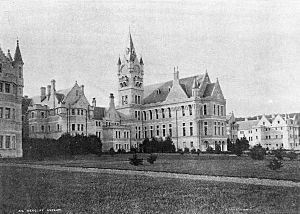
In September 1945, Janet left her teacher-training class in Dunedin. She was then briefly admitted to a psychiatric ward in a local hospital. Janet did not want to go home because of arguments between her father and brother. So, she was moved to Seacliff Lunatic Asylum, a well-known mental institution.
For the next eight years, Janet was admitted to psychiatric hospitals many times. These included Seacliff, Avondale Lunatic Asylum, and Sunnyside Hospital. During this time, she was diagnosed with schizophrenia. She received treatments like electroconvulsive therapy and insulin shock therapy.
In 1951, while still in Seacliff, Janet's first book was published. It was a collection of short stories called The Lagoon and Other Stories. This book won the Hubert Church Memorial Award, a major literary prize in New Zealand. Because of this award, the brain surgery (lobotomy) she was scheduled to have was cancelled.
Four years later, after leaving Seacliff for good, Janet met writer Frank Sargeson. She lived and worked at his home in Takapuna, near Auckland, from 1955 to 1956. There, she wrote her first full novel, Owls Do Cry, which was published in 1957.
Writing Career: 1957–1989
Janet Frame left New Zealand in late 1956. For the next seven years, she wrote many books. She lived and worked in Europe, mostly in London, and also spent time in Ibiza and Andorra. In 1958, she legally changed her name to Nene Janet Paterson Clutha. She did this partly to be harder to find and partly to honour a Māori leader she admired, Tamati Waka Nene, and the Clutha River.
Janet still struggled with anxiety and depression. In 1958, she admitted herself to the Maudsley Hospital in London. A psychiatrist there, Alan Miller, suggested she had never actually suffered from schizophrenia. To help with the effects of her years in hospitals, Janet began therapy with psychiatrist Robert Hugh Cawley. He encouraged her to keep writing. Janet dedicated seven of her novels to him.
Janet returned to New Zealand in 1963. She spent a short time living in rural Suffolk, England, which inspired her 1965 novel The Adaptable Man. In 1965, she received the Robert Burns Fellowship at the University of Otago. She later lived in many different parts of New Zealand's North Island.
During this time, Janet traveled a lot, sometimes to Europe, but mainly to the United States. She stayed at artists' colonies like MacDowell and Yaddo. She became close friends with several Americans, including painter Theophilus Brown and poet May Sarton. Her long-time friend and former university tutor, John Money, lived in North America. Janet often stayed at his home in Baltimore.
In the 1980s, Janet Frame wrote three autobiographies: To the Is-land, An Angel at My Table, and The Envoy from Mirror City. These books told the story of her life up to her return to New Zealand in 1963. The Australian novelist Patrick White called the first two books "amongst the wonders of the world."
Director Jane Campion and screenwriter Laura Jones turned the three books into a TV series. It was later released as a successful movie, An Angel at My Table. Actresses Kerry Fox, Alexia Keogh, and Karen Fergusson played Janet at different ages. Her autobiographies sold more copies than any of her previous books. The film helped a new generation of readers discover her work. These successes made Janet more famous.
In 1983, Janet was made a Commander of the Order of the British Empire (CBE) for her contributions to literature. That same year, To the Is-land won the Goodman Fielder Wattie Book of the Year Award, New Zealand's top literary prize.
Janet wrote her autobiographies to "set the record straight" about her past and her mental health. However, people continued to wonder about her mental state. In 2007, after her death, a medical expert suggested she might have been on the autism spectrum. This idea was later debated by her literary executor.
During her lifetime, Janet Frame's books were mainly published by an American company, George Braziller. She won many literary prizes in New Zealand. In 1989, she won the Commonwealth Writers' Prize for her last novel, The Carpathians.
Later Years: 1990–2000
On 6 February 1990, Janet Frame became the sixteenth person to be appointed to the Order of New Zealand. This is the highest honour in the country. She was also an honorary member of the American Academy of Arts and Letters. In New Zealand, she received two honorary doctorates and became a cultural icon.
Sometimes, there were rumours that Janet Frame might win the Nobel Prize in literature. This happened in 1998 when a journalist saw her name on a list (which turned out to be in alphabetical order). It happened again in 2003 when a Swedish literary critic wrongly predicted she would win.
People started studying Janet Frame's writing in universities from the late 1970s. They looked at her work from different viewpoints, like feminist ideas. Several books were written about her work. In 1992, the University of Otago in Dunedin held a conference about her writing.
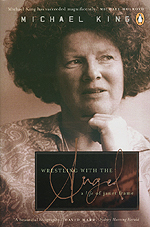
In 2000, New Zealand historian Michael King published an official biography of Janet Frame called Wrestling with the Angel. This book was released in New Zealand and North America at the same time. King's detailed book received both praise and criticism. Some people wondered how much Janet had influenced the book. Others felt he didn't fully capture her complex personality. King also admitted that he left out some information that would have caused her "embarrassment and distress." He called this "compassionate truth." King defended his book, saying that future biographies could fill in any missing parts.
Death and New Books
Janet Frame passed away in Dunedin in January 2004, at the age of 79. She died from acute myeloid leukaemia, a type of cancer. She had recently received one of the first Arts Foundation of New Zealand Icon Awards. These awards celebrate New Zealand artists who have achieved the highest artistic standards.
After her death, several new works by Janet Frame were published. These included a book of poetry called The Goose Bath, which won New Zealand's top poetry prize in 2007. This caused a small debate among critics who felt giving a prize to a posthumous (after death) work "set an awkward precedent." A short novel, Towards Another Summer, was also published after her death. It was inspired by a weekend she spent with a British journalist and his family. In 2008 and 2010, two previously unpublished short stories appeared in The New Yorker magazine.
In 2011, Penguin Books in New Zealand bought the rights to publish three new editions of Janet Frame's work. These were Janet Frame in Her Own Words (2011), Gorse is Not People: New and Uncollected Stories (2012), and the novel In the Memorial Room (2013).
In 2010, a novel called Gifted by Patrick Evans was published. It was a fictional story about Janet Frame's relationship with Frank Sargeson when she lived at his home in 1955–56. This time was also shown in Campion's film, An Angel at My Table. In 2013, Evans' novel was made into a play. While the play received good reviews, Janet's niece and literary executor, Pamela Gordon, strongly criticized it. She felt it "was designed to demean Frame" and showed an untrue picture of her aunt. The play's director defended it, saying Gordon was "overprotective of [Frame's] legacy." Evans mostly stayed out of the argument.
Awards and Honours
- 1951: Hubert Church Prose Award (The Lagoon and other Stories)
- 1956: New Zealand Literary Fund Grant
- 1958: New Zealand Literary Fund Award for Achievement (Owls Do Cry)
- 1964: Hubert Church Prose Award (Scented Gardens for the Blind); New Zealand Literary Fund Scholarship in Letters.
- 1965: Robert Burns Fellowship, University of Otago, Dunedin, NZ
- 1967: "Buckland Literary Award." (The Reservoir and Other Stories/A State of Siege)
- 1969: New Zealand Literary Fund Award (The Pocket Mirror: Poems)
- 1971: Buckland Literary Award (Intensive Care); Hubert Church Prose Award. (Intensive Care)
- 1972: President of Honour: P.E.N. International New Zealand Centre, Wellington, NZ
- 1973: James Wattie Book of the Year Award (Daughter Buffalo)
- 1974: Hubert Church Prose Award (Daughter Buffalo); Winn-Manson Menton Fellowship.
- 1978: Honorary Doctor of Literature (D.Litt. Honoris Causa) University of Otago, Dunedin, NZ
- 1979: Buckland Literary Award (Living in the Maniototo)
- 1980: New Zealand Book Award for Fiction (Living in the Maniototo)
- 1983: Buckland Literary Award; Sir James Wattie Book of the Year Award (To the Is-Land); C.B.E. (Commander, Order of the British Empire)
- 1984: Frank Sargeson Fellowship, University of Auckland, NZ
- 1984: New Zealand Book Award for Non-Fiction (An Angel at My Table); Sir James Wattie Book of the Year Award (An Angel at My Table); Turnovsky Prize for Outstanding Achievement in the Arts
- 1985: Sir James Wattie Book of the Year Award (The Envoy from Mirror City)
- 1986: New Zealand Book Award for Non-Fiction (The Envoy from Mirror City); Honorary Foreign Member: The American Academy and Institute of Arts and Letters
- 1989: Ansett New Zealand Book Award for Fiction; Commonwealth Writers Prize for Best Book (The Carpathians)
- 1990: O.N.Z. (Member, Order of New Zealand)
- 1992: Honorary Doctor of Literature (D.Litt.), University of Waikato, Hamilton, NZ
- 1994: Massey University Medal, Massey University, Palmerston North, NZ
- 2003: Arts Foundation of New Zealand Icon Award; New Zealand Prime Minister’s Award for Literary Achievement
- 2007: Montana Book Award for Poetry (The Goose Bath)
See also
 In Spanish: Janet Frame para niños
In Spanish: Janet Frame para niños
- New Zealand literature
 | Roy Wilkins |
 | John Lewis |
 | Linda Carol Brown |


